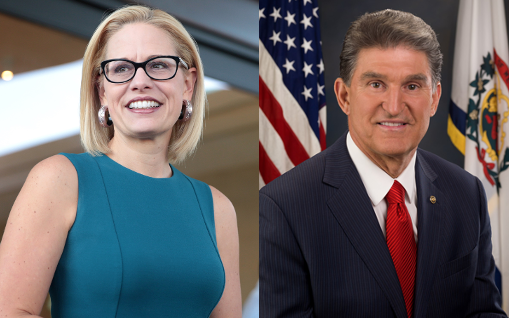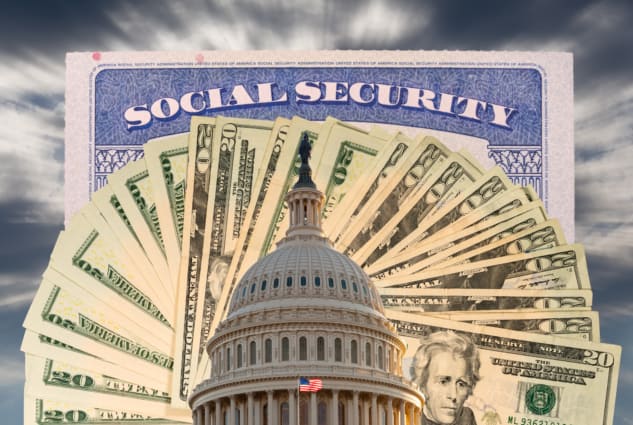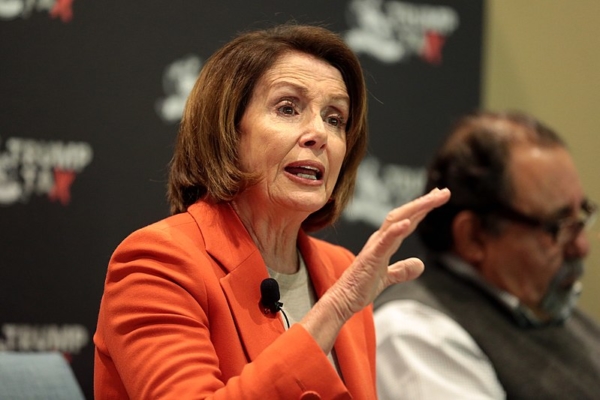NCPSSM President to Manchin & Sinema: Protect Seniors’ Voting Rights!

Wikimedia Commons
The National Committee to Preserve Social Security and Medicare is appealing to Senators Joe Manchin and Krysten Sinema to support changes to the filibuster in order to protect older Americans’ voting rights. In letters to each senator co-signed by some 40 advocates and political influencers, NCPSSM President and CEO Max Richtman writes that adjusting the Senate filibuster is the only way to safeguard ballot access for seniors if enough Republican Senators won’t support new federal voting rights legislation. Such legislation is necessary, says Richtman, because of restrictive, new state laws that infringe on seniors’ right to vote by mail.
The National Committee, with millions of members and supporters nationwide (including some 38,000 in Arizona and 12,000 in West Virginia), supported both senators’ campaigns in 2018.
“We urge you to support a narrow change to the filibuster rule to allow the Senate to approve new voting rights legislation by a simple majority vote. This crucial legislation will help to protect our democracy and the right to vote for all Americans, including older Arizonans and West Virginians who cast ballots by mail.” – Max Richtman, President and CEO, National Committee to Preserve Social Security and Medicare.
At least 14 states have passed new laws that restrict access to the vote. The West Virginia State Senate has approved a bill which would move up the deadline for requesting an absentee ballot from six days before Election Day to 11 days. Meanwhile, Arizona lawmakers enacted legislation to prohibit sending absentee ballots or ballot applications to voters unless requested.
“The sole purpose of restrictive, new state laws is to suppress votes that the majority party in these legislatures don’t like. We urge Senator Sinema and Senator Manchin to protect American voters from being disenfranchised — including millions of seniors who otherwise can’t safely make it to the polls. If it becomes clear that adjusting the filibuster is the only option to guarantee voting rights, we hope the Senator will reconsider her position.” – Max Richtman, 9/21/21
Currently, seniors who are immobile, sick, or don’t want to risk being infected by the delta COVID variant can request mail ballots — along with those who cannot drive or lack access to mass transit. Voting by mail allows these older citizens to exercise their constitutional rights in a safe, convenient way. In 2020, the majority of voters over age 65 cast their ballots by mail.
Those who want to restrict that right falsely claim that voting by mail is rife with fraud. Nothing could be farther from the truth. Studies have shown mail-in voting to be consistently free of fraud. An M.I.T. study found that only 0.00006% of 250 million mail-in votes nationwide were fraudulent. Additionally, scholars at Stanford University analyzing more than twenty years’ worth of data in California, Utah and Washington found vote-by-mail did not advantage one political party over another.
Nevertheless, Republicans in the Arizona legislature and West Virginia state senate bought into the “Big Lie” that the 2020 presidential election results were illegitimate. Arizona’s law is a solution in search of a problem since county election officials recently reported fewer than 200 cases of potential voter fraud out of more than 3 million ballots cast statewide in the 2020 election.
The National Committee implores both senators to stand up for seniors by supporting a narrow change to the filibuster rule to allow the Senate to approve the For the People Act on a simple majority vote. That is the only truly democratic choice.
Read our letters to Senator Sinema and Senator Manchin.
Holdout House Dems Should Side with the People, Not Big Pharma



Nearly 90% of the American public wants Medicare to be able to negotiate drug prices with Big Pharma – including a majority of Republicans. Unfortunately, the will of the people is being thwarted not only by Republicans on Capitol Hill — who refuse to support Medicare price negotiation — but holdout ‘moderate’ Democrats.
This week three Blue Dog Democrats, Reps. Kurt Schrader (D-OR), Kathleen Rice (D-NY), and Scott Peters (D-CA), voted against Medicare drug price negotiation in the House Energy & Commerce Committee, preventing the measure from being sent to the House floor. Over at the House Ways and Means Committee, Rep. Stephanie Murphy (D-FL) was the sole Democrat casting her vote against Medicare negotiation, though there were enough other votes to pass it out of that committee. (Rep. Murphy voted against every provision in the Democrats’ $3.5 trillion plan, saying she needed more time to study it.)
These ‘No’ votes have not yet doomed Medicare drug cost negotiation – which we have long argued is the best way to reduce prescription prices for seniors – but they do signal that there may not be enough Democratic support for the measure to pass in the full U.S. House, where the party has only the slimmest of majorities.
Even if Medicare price negotiation survives a House vote (as part of President Biden’s $3.5 trillion Build Back Better plan), it is unlikely to garner sufficient support in the Senate. Republicans, of course, will not vote for it, and Senate Democrats are already working on a more modest drug price reform package that does not allow Medicare to negotiate prices.
“The purpose of the drug pricing policy is to pay for a host of new health care policies. The way it works is that it allows the government to restrict the maximum price that drug companies can charge for insulin and a set of expensive drugs that don’t face competition, and generate savings by forcing pharmaceutical companies to take the hit — the measure could save the government $500 billion over a decade.” – MSNBC, 9/16/21
This is another one of those moments in history when reformers put forward commonsense proposals (with the support of the majority of the American people) — and wealthy, powerful interests block their efforts. Big Pharma has intensified its lobbying efforts to defeat drug pricing reform – and especially the ability of Medicare to negotiate prices. In fact, Big Pharma successfully lobbied to exclude Medicare price negotiation when the Medicare Modernization Act was written and enacted in 2003.
Seniors and their advocates felt that this year – with a Democratic President and both houses of Congress in the party’s control – was a golden opportunity to realize the long-held goal of Medicare drug price negotiation. But Big Pharma’s choke hold on federal policy decisions is formidable.
Some question the role that campaign contributions could be playing in this scenario. Of the three House Energy & Commerce committee Democrats who voted to nix Medicare price negotiation, two receive significant contributions from Big Pharma. Reps. Schrader and Peters have collected nearly $1.5 million over the course of their careers. In fact, Congressman Peters is the House’s “top recipient of pharmaceutical industry donations in the 2022 election cycle,” according to MSNBC. (Rep. Rice has received a relatively modest $8,500 from the industry since 2020, says MSNBC.)
“Leaders of nearly two dozen drug manufacturers said that though they share Americans’ concerns over healthcare costs, ‘these dangerous policy experiments are not the answer.’ Dangerous policy experiments? Nearly every other developed country worldwide allows its government insurance system to negotiate drug prices. And guess what? This reasonable use of market power allows people in other countries to pay roughly half what Americans pay for prescription meds.” – Los Angeles Times, 9/16/21
Of course, everyday Americans living paycheck to paycheck deserve to be heard, too. And while seniors’ advocates like us continue to fight for meaningful reform, it can be an uphill battle against Big Pharma’s billions. Not for lack of trying by the President. Earlier this week, President Biden reiterated his support for Medicare price negotiation, which is part of his Build Back Better plan.
We and our members and supporters still will embrace other meaningful reforms to emerge from the 117th Congress. Linking drug price increases to inflation and capping Medicare beneficiaries’ out of pocket drug costs are solid steps toward taming prescription prices. They would help seniors on fixed incomes — and likely lower drug costs for the public at large. But the American people want the full package, including Medicare price negotiation. They know that out of control drug prices are hurting Americans of all ages. When people ration medications or don’t fill prescriptions because of cost, it can literally kill them. Members of Congress should not turn their backs on the people they are supposed to represent. They should muster the courage to stand with the public — and not Big Pharma.
Big Pharma Dreads Medicare Price Negotiation



Big Pharma is none too happy with legislation to allow Medicare to negotiate drug prices, according to published accounts and members of the advocacy community. Such opposition is nothing new, of course, but it has intensified as the Democrats’ (and the President’s) drug reform plans work their way through Congress as part of the budget reconciliation process.
Of course, the drug industry fears that allowing Medicare to negotiate drug prices would cut into its sizeable profits.
“Big Pharma — one of the most profitable industries in America — is absolutely horrified at the idea that its ability to extract all those trillions of dollars might be limited.” – Washington Post, 8/27/21
Currently, Big Pharma can set prices at will – no matter how outrageous or unaffordable. (Simply look at the skyrocketing price of insulin, for example.) Medicare negotiation would force the industry to the bargaining table with the federal government – saving some $456 billion in drug costs over ten years. But price negotiation was specifically excluded from legislation creating the Medicare Part D Prescription drug benefit in 2003, at the industry’s behest.
Meanwhile, overwhelming majorities of Americans from both parties support this commonsense proposal in poll after poll. But Big Pharma is running an expensive ad campaign to scare the public. One television ad warns about “Pelosi’s socialist drug plan.” Another features a senior with diabetes named “Sue” who claims that price negotiation “would make it harder for people on Medicare to get the medicines we need.” No, actually, it’s the high cost of insulin and other essential drugs that make it harder for people on Medicare to get the medicines they need. Too many beneficiaries simply can’t afford their medications — and cut pills in half or skip filling prescriptions altogether.
The pharmaceutical lobby warns that “Washington (would) control the prescription drug market” through price negotiation. If that were true, then the Veterans Administration would already be controlling the market, because it has been negotiating drug prices with Big Pharma for years. The federal government constantly negotiates prices for private sector services and products. It’s part of the free-market system that conservatives tout. Does that mean Washington ‘controls’ the market for everything from concrete to aircraft? Obviously not. In fact, we are the only Western industrialized democracy that does not negotiate prescription drug prices with manufacturers – or have an agreed upon pricing structure.
“American drug purchasers pay substantially higher prices for drugs than their counterparts in other developed countries. A recent paper from the RAND Corporation cited in the government proposal estimates that prescription drugs in the United States cost more than 250 percent of the prices paid by other countries.” – New York Times, 9/9/21
Big Pharma insists that price negotiation would stifle innovation in the pharmaceutical market, even though the federal government puts significant resources into research on new drugs. (In fact, the federal government was instrumental in developing the mRNA technology used in the Moderna and Pfizer vaccines.)
“A study underwritten by the National Biomedical Research Foundation, mapped the relationship between NIH-funded research and every new drug approved by the FDA between 2010 and 2016. The authors found that each of the 210 medicines approved for market came out of research supported by the NIH. Of the $100 billion it spent nationally during this period, more than half of it — $64 billion — ended up helping the development of 84 first-in-class drugs.” – Other98.com
Medicare price negotiation is one facet of the Democrats’ proposed drug reforms, along with lower out-of-pocket caps for beneficiaries and tying the increase of prices to inflation. Advocates consider negotiation the most potent tool for bringing down seniors’ drug costs. But the measure must survive the reconciliation process in the Senate, where the Democrats need fifty votes to enact reform. Seventy-two U.S. Senators received contributions from Big Pharma in the last election cycle. That is not to say that some Senators won’t do the right thing, but the sway of drug industry dollars can be powerful.
In the end, lawmakers’ priority should be the people on fixed incomes who can’t afford their medications, the Americans who have died from rationing medicines, the retirees forced to choose between groceries and prescription drugs because of cost. They are the ones who badly need relief. Drug manufacturers will be perfectly fine — even if the price negotiation they dread is finally enacted.
Social Security Trustees Report Signals Now is the Time to Strengthen & Expand the Program



Americans who rely on Social Security can exhale for a moment now that the program’s Trustees have reported that the trust fund will remain solvent until 2034. That’s only one year earlier than projected in last year’s report.
“There is no need to sound the alarm, but now is the time to address Social Security’s long-term solvency – and provide an overdue boost in benefits. Phone calls and emails to Congress are definitely warranted at this critical juncture.” – Max Richtman, President and CEO of the National Committee to Preserve Social Security and Medicare.
The program, which has never missed a benefit payment in its 86-year history, remains strong. If Congress does not take curative action and the trust fund becomes depleted, Social Security still could pay 78% of benefits because of the steady inflow of revenue from workers’ payroll contributions. But that poses a huge financial risk for the millions of retirees who depend on Social Security for most if not all of their income. It also raises a serious political risk for members of Congress who fail to boost the program’s finances so that the trust fund remains solvent beyond 2034.
At the same time, benefit adequacy needs to be addressed. Living on an average monthly benefit of $1,540 is tough. Retirement savings are dwindling, pensions are disappearing, and the cost of senior housing and medical care are soaring. For over six years, Congressman John Larson has been driving efforts to strengthen Social Security by adjusting the payroll wage cap so that high income earners begin paying their fair share.
Rep. Larson has also proposed an across-the-board boost for all retirees, enhanced benefits for the most vulnerable seniors, and a more accurate formula for calculating annual cost-of-living adjustments (COLAs) so that benefits truly keep pace with inflation. Rep. Larson’s proposals align with President Biden’s own prescriptions for improving Social Security. These proposals win approval from a majority of Americans in poll after poll.
“Of course, the default response from conservatives will be to suggest, indirectly or otherwise, that Social Security benefits must be cut to address the program’s funding shortfall. Some will insist that Social Security be privatized, which would gamble workers’ hard-earned retirement benefits on Wall Street. Meanwhile, conservatives likely will oppose common sense revenue-side measures that would actually boost benefits, including Rep. Larson’s proposed adjustment of the payroll wage cap.” – Max Richtman
The depletion of the trust fund in 2034 is not a foregone conclusion. With Democrats in control of the House and Senate — and an advocate for Social Security in the White House — advancing legislation to strengthen and expand the program is finally within reach. But the public must demand that Congress muster the political will to get it done. The Trustees Report is a firm reminder that time is running short.
The House-passed Budget Resolution Holds Historic Promise for Seniors



Wikimedia Commons
The Mainstream Media seemed to relish the conflict between House Speaker Pelosi and moderate Democrats over the President’s $3.5 trillion “human infrastructure” spending plan. A CNN opinion piece screamed, How the Mess in Congress Shows why Democrats are Right to be Freaking Out, while a headline in Politico read, Mutually Assured Destruction. Of course, Democracy is a messy process and Democratic party politics is even messier. But in the end, the budget resolution passed the House on Tuesday after leadership reached an agreeent with moderate Democrats to vote on a separate, bipartisan infrastructure package on September 27th.
“The agreement reached will kick off a flurry of activity over the next several weeks as top House Democrats work with their Senate counterparts to privately craft a spending bill that can pass both chambers.” – Politico, 8/24/21
Lost in much of the coverage is the actual intent of the budget resolution – to lift-up vulnerable Americans during very trying times, especially the nation’s seniors.
President Biden praised Congress’ progress on his “Build Back Better” agenda Tuesday afternoon, saying the country is a “step closer to truly investing in the American people.” – CBS News, 8/24/21
The passage of the resolution by the House sets up a budget reconciliation process where the President’s (and most Congressional Democrats’) priorities can move forward, even if Republicans refuse to support them. Once the reconciliation process is over sometime this fall, seniors are likely to see historic expansions in the social safety net that protects them.
“Passing this rule paves the way for the Building Back Better plan, which will forge legislative progress unseen in 50 years, that will stand for generations alongside the New Deal and the Great Society.” – House Speaker Nancy Pelosi, 8/24/21
The Biden/Democratic plan includes adding dental, vision, and hearing coverage to traditional Medicare. This expanded coverage is crucial to seniors’ overall health, since the absence of proper dental, vision, and hearing care can increase the risk of grave medical consequences – from dementia to disabling injuries. Seniors have not seen their Medicare benefits expanded since 2003 with the passage of the significant, but flawed Part D prescription drug program.
The budget legislation will aim to correct the main shortcoming in Medicare Part D by allowing the program to negotiate drug prices directly with Big Pharma. This will save beneficiaries an estimated $102 billion over ten years. The National Committee has fought hard for this goal, as it is one of the most effective methods to bring down prescription prices not only for seniors – but for all Americans.
Similarly historic would be the allocation of billions of new federal Medicaid dollars for Home and Community Based Services (HCBS), which allow seniors to receive long-term care outside of institutional settings. Research has shown that older people have better health outcomes when they can remain in their homes and communities. Meanwhile, the pandemic has only highlighted the risks of putting seniors into nursing homes.
Now that the budget resolution has passed, the committees of jurisdiction in the House and Senate can begin drafting actual reconciliation legislation with specific dollar figures attached to each initiative. That process is expected to begin in September, with a vote on the package sometime this fall. There are no guarantees here. NCPSSM Director of Government Relations and Policy Dan Adcock says that negotiators will try to cleave to the President’s priorities, but will likely have to compromise on some items in order to win enough votes within the Democratic caucuses in both houses.
Some of the moderates who rebelled against Speaker Pelosi’s plan to move forward on the budget resolution have expressed skepticism about the $3.5 trillion price tag and may try to reduce it. So have Sens. Joe Manchin (D-WV) and Krysten Sinema (D-AZ), whose votes are crucial to the passage of a reconciliation bill in the Senate.
If the overall amount of the spending plan is reduced, some of the party’s (and the President’s) priorities may be squeezed. Adcock says that the President’s proposal to spend an additional $400 billion on HCBS, for instance, will probably be lowered to something approximating $150 billion instead. A compromise on Medicare expansion may involve more modest dental, vision and hearing coverage – or the addition of one of those (most likely dental) coverages at the expense of the others. “We’re looking at the most we can get (for seniors) given the current political circumstances,” says Adcock, noting that Democrats have the slimmest of margins in the House and Senate.
Amid the uncertainty and likely compromises, though, it’s important to keep in mind that progress on any of these priorities would be historic. This is the first time in 12 years that both President and the majority party in Congress are committed to a long-overdue widening of America’s social safety net. In the wake of a Great Recession, growing wealth inequality, soaring health care and prescription prices, and a devastating pandemic, Americans of all ages should rightly expect to see these expansions finally become law.


